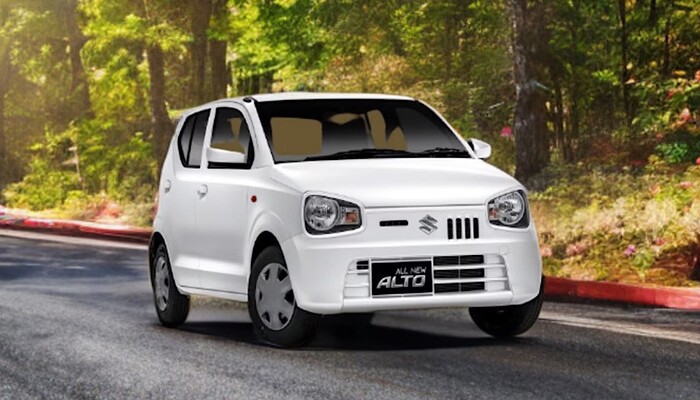Suzuki Alto sales in Pakistan faced a sharp downturn last month, shocking both industry insiders and car buyers. Once the country’s top-selling compact car, the Alto recorded a dramatic 75% drop in sales after the government introduced new taxation measures. The sudden decline highlights the impact of fiscal policy on the automobile market, especially for budget-friendly vehicles.
A Sudden Decline
According to the Pakistan Automotive Manufacturers Association (PAMA), sales of the Suzuki Alto plunged from 9,497 units in June to only 2,327 in July. This fall marks one of the steepest declines for the model in recent years. For a car often seen as the go-to option for first-time buyers, the figures raised alarm in the auto sector.
Impact of New Taxes
The drastic fall in sales followed a change in government taxation policy. In July, the General Sales Tax (GST) on cars up to 850cc increased from 12.5% to 18%. This alone made small cars less affordable. Alongside the GST hike, the government introduced a new levy on vehicles. Known as the NEV levy, it applied 1% on cars up to 1300cc, 2% on vehicles between 1301cc and 1800cc, and 3% on larger cars.
Though the Suzuki Alto falls under the 850cc category, the rise in GST heavily affected its price. Buyers who once considered it an economical choice suddenly faced higher costs.
Price Hike Pushes Buyers Away
In response to the new taxes, Pakistan Suzuki Motors Company (PSMC) revised the Alto’s price upward. The latest figure stood at Rs. 3,326,450. For many middle-class families and first-time car owners, this new price tag was simply out of reach.
The Alto has long been popular because of its affordability. Many young professionals and small families relied on it as an entry-level car. With the price increase, the model slipped out of the budget segment and moved closer to more expensive vehicles, reducing its competitive edge.
Attempt to Ease the Shock
PSMC tried to soften the impact on buyers by introducing an early invoicing strategy. In June, the company processed advance orders for July and August. This allowed some buyers to secure their cars at lower rates before the new taxes took effect.
While this move provided short-term relief for certain customers, it also led to distorted sales figures. The high sales in June partly reflected buyers rushing to take advantage of early invoicing. As a result, July’s numbers appeared even weaker when compared with the unusually strong figures from the previous month.
Read: Gold price in Pakistan surges amid global market rally
Broader Impact on the Market
The fall in Suzuki Alto sales did not only affect the company. It also sent ripples through Pakistan’s entire automobile market. Dealers reported reduced footfall, and many potential customers delayed purchasing decisions, hoping for policy changes or price adjustments in the future.
The impact was especially severe because the Alto dominates the small car category. Its sales trends often signal broader consumer behavior. A slump of this scale suggested that many households were struggling with affordability amid rising inflation and tighter taxation.
Policy Decisions Under Scrutiny
The sharp fall also sparked debate on the government’s taxation policies. Critics argued that increasing GST on smaller cars placed an unfair burden on low- and middle-income buyers. These groups form the majority of Pakistan’s car market, and taxing them heavily risked slowing overall demand.
Industry experts warned that high taxation could discourage investment in the local automobile sector. They pointed out that budget-friendly cars like the Alto drive sales volume. If such models lose their appeal, manufacturers could face challenges in sustaining production levels.
A Shift in Buyer Behavior
With the Alto becoming more expensive, some buyers started considering used cars as alternatives. Others delayed their plans altogether, waiting for prices to stabilize. Dealers observed a growing preference for second-hand vehicles, especially among younger customers who once relied on Alto as their first choice.
The shift could change market dynamics in the coming months. If demand for new compact cars continues to fall, it may open more space for imported used cars or push buyers toward motorcycles as a cheaper option.
The Road Ahead for Suzuki Alto
For Suzuki, the coming months will be critical. The company must balance the effects of government taxation with strategies to keep the Alto competitive. While early invoicing offered a temporary solution, long-term sales will depend on how quickly affordability can be restored.
Industry analysts believe PSMC may need to explore localized cost reductions, flexible financing options, or promotional packages to maintain demand. Without such measures, the Alto risks losing its position as Pakistan’s most popular compact car.
Outlook for the Auto Sector
The decline in Suzuki Alto sales serves as a warning for the wider automobile industry. Taxation policies can quickly reshape consumer demand. While luxury and high-end models may absorb higher costs, small cars cannot.
If affordability continues to decline, the auto sector could face slower growth in the months ahead. For many households, owning a car might once again move out of reach.
Follow us on Instagram, YouTube, Facebook,, X and TikTok for latest updates
